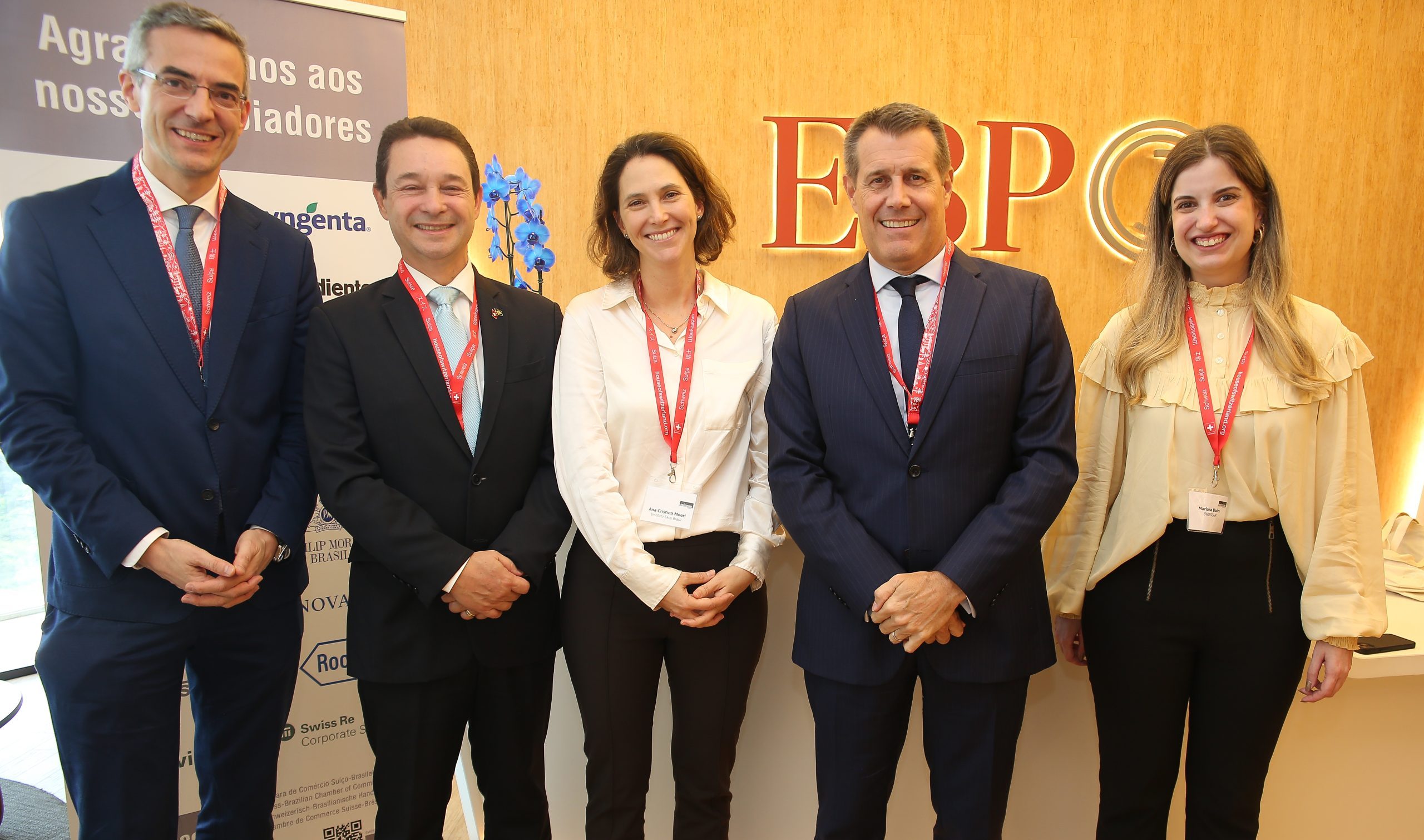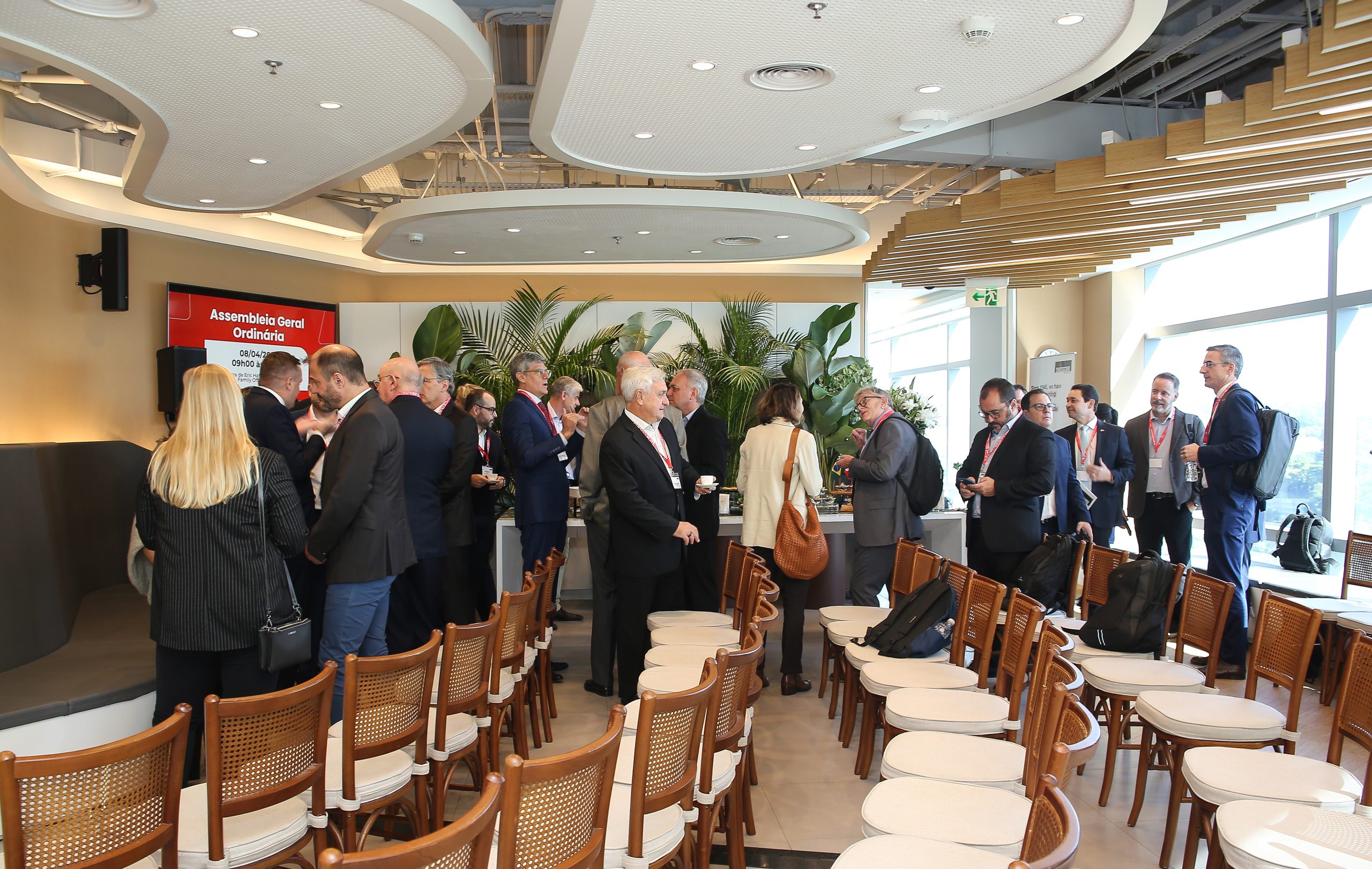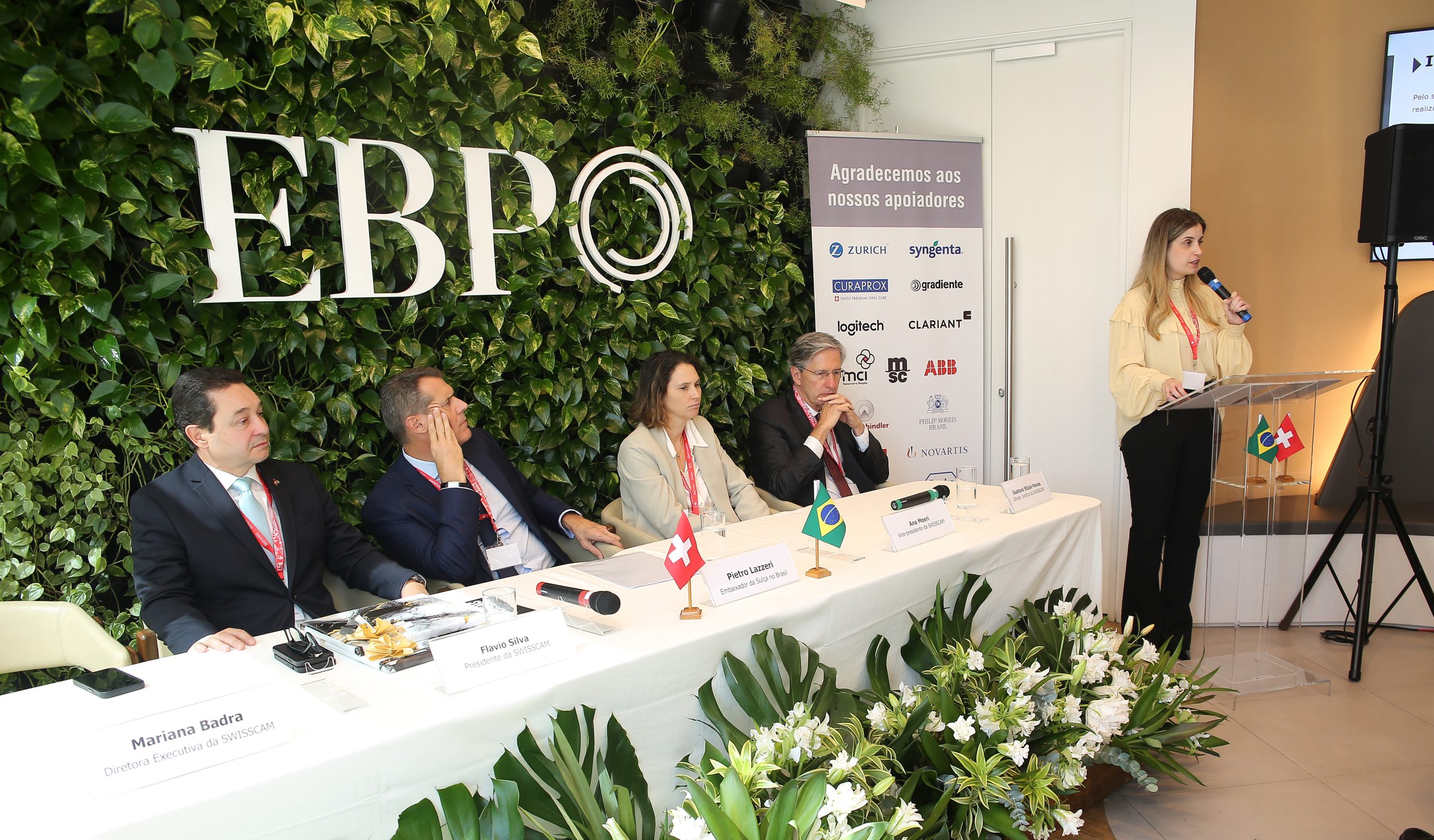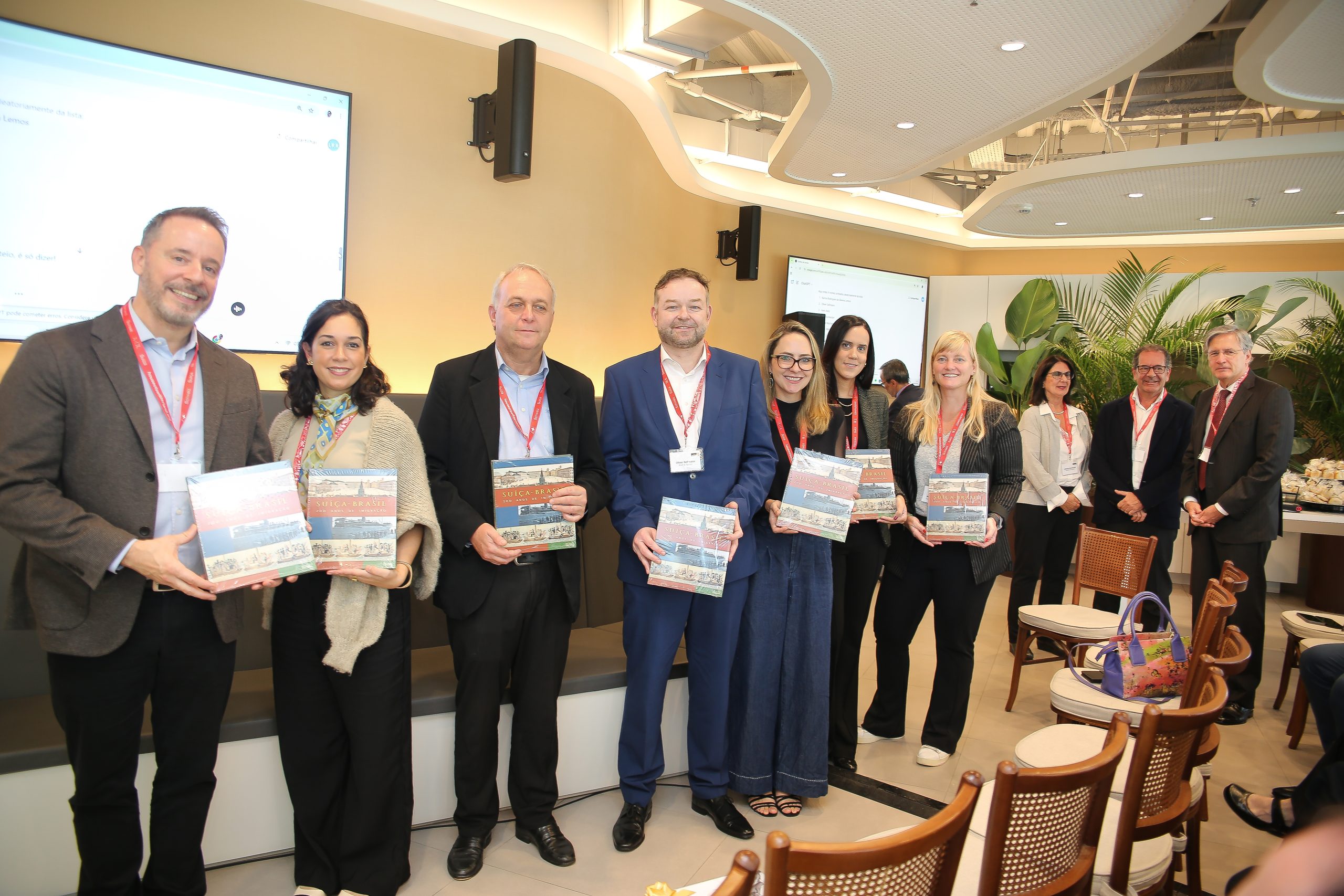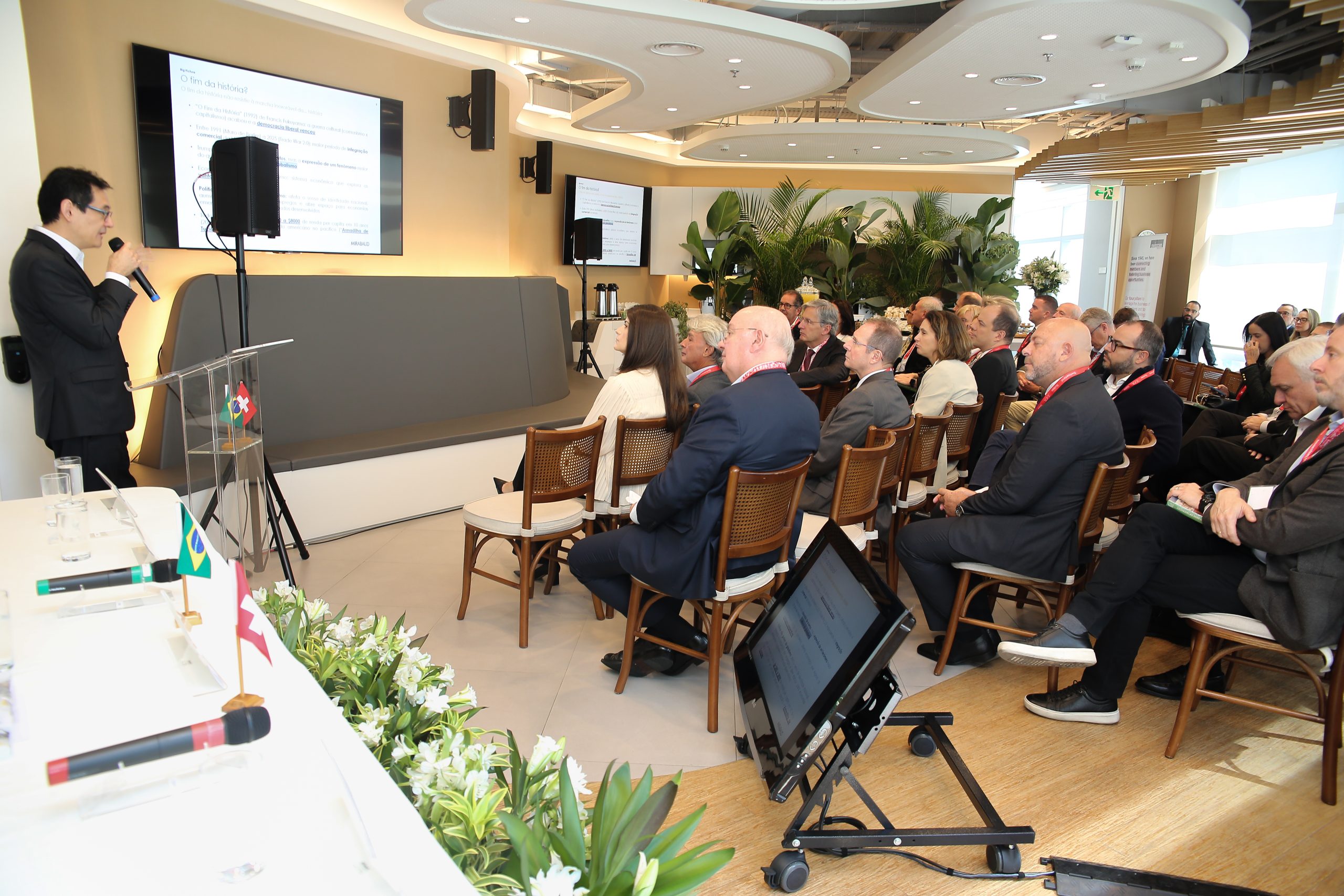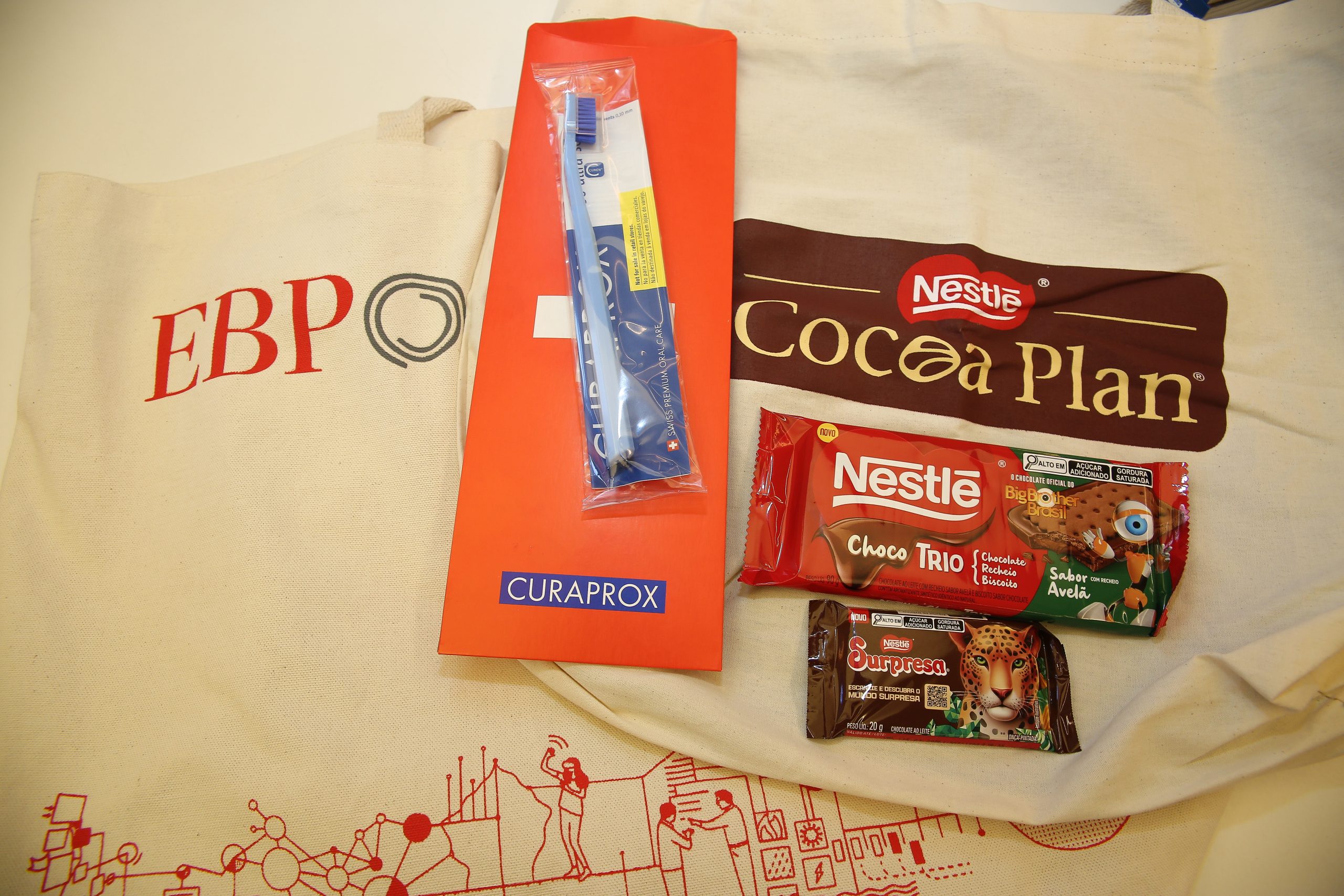On April 8, 2025, the Ordinary General Meeting of SWISSCAM was held in the Geocoffee Room of the EBP in São Paulo.
SWISSCAM’s President, Flavio Silva, opened the event by welcoming all the members and expressed his thanks to the EBP for kindly hosting us in their space. He highlighted the essential support of the committee coordinators, board members and staff for the success of SWISSCAM’s initiatives. She also thanked the Swiss Embassy, the Swiss Consulate General in São Paulo and the other Swiss representations in Brazil for their invaluable partnership.
He ended with a special thank you to our Gold member companies, who contribute immensely to strengthening SWISSCAM: Roche, Nestlé, Atlas Schindler, Zurich, ABB, Hilti, Clariant, Novartis, Swiss Re, Syngenta, Curaprox, Philip Morris, MSC, MCI, Grupo Gradiente and Logitech.
Swiss Ambassador Pietro Lazzeri, Honorary President of SWISSCAM, took the floor emphasizing the positive economic results with Brazil. Switzerland is the 5th largest investor in Brazil. Between 2023 and 2024, Swiss exports increased by 17% in the country.
The year 2024 was also marked by an intense Swiss presence in Brazil. There were more than 30 official visits, mainly on economic issues, such as the presence of Federal Councillor Karin Keller-Sutter at the G20 meeting with finance ministers in February; the visit of Federal Councillor Ignazio Cassis, head of the Department of Foreign Affairs, in July; and the participation of Federal Councillor Elisabeth Baume-Schneider at the G20 meeting with health ministers in November. In addition, there was a visit from the Secretary of State for Economic Affairs, Helene Budliger, and the Secretary of State for Foreign Affairs, Alexandre Fazer. In Switzerland, the Ambassador mentioned the presidential meeting that took place in Geneva in July.
One of the most important issues on the bilateral and regional agenda is the agreement between Mercosur and EFTA (European Free Trade Association). To this end, a parliamentary delegation from the European bloc was received to strengthen and advance the negotiations, which are in their final stages. According to the Ambassador, the intention is to conclude the negotiations in the first half of the year and sign the agreement at the end of 2025.
2025 began with another visit to Brazil by the Swiss Chancellor. In May, it will be the turn of the Swiss Senate President Andrea Caroni’s delegation, accompanied by other senators, to visit Rio de Janeiro for the Web Summit, Brasilia and São Paulo, with an economic agenda.
In the year of COP30, Brazil will be at the center of global discussions on climate change, energy transition and sustainability. In this context, the Ambassador said that Switzerland will be present in Belém do Pará in two places: at the Swiss Pavilion in the Green Zone and at the Goeldi Museum with the Swiss-Brazilian Chalet, for innovation and research events.
After four years in Brazil, and believing in the great potential of the Brazilian economy, the Ambassador will soon take over the global economic cooperation directorate of the State Secretariat for Economic Affairs in Bern, which has Brazil as one of its priorities. He concluded by thanking Consul General Pierre Hagmann, who is also leaving shortly to take up the position of Swiss Ambassador to Bulgaria, for the very significant work he has done.
Executive Director Mariana Badra continued the event by presenting the activities carried out in 2024 and the launch of the Annual Report, which included illustrative photos of Belém and the Amazon in the context of COP 30, articles on the subject by Ana Moeri, from the Ekos Institute, and Lani Goeldi, from the Oswaldo Goeldi Artistic Association, as well as the traditional message from the Swiss Ambassador and the Brazilian Ambassador in Bern.
Mariana also presented the financial results for 2024, the composition of the board, the budget for 2025 and the planned activities.
Legal Director Gustavo Stüssi conducted the formalities for the approval of the accounts and the composition of the vacant board positions, with the entry of the new board members: Caio Zuccarelli (Clariant); Johann Gigl (Zurich Airport); Katrin Dalibor (SWISS) and Luciano Hoffmann (Novartis).
Shortly after the Assembly meeting, Eric Hatisuka, CIO of the Mirabaud Family Office (Brazil) and head of the local Investment Committee, gave a talk to the members on “The Economic Outlook and Challenges for Brazil”.
Looking back on the international scene, Eric cites the period between 1991, after the fall of the Berlin Wall, and 2025 as the greatest in history in terms of trade integration and multilateralism. This opened up space for emerging economies to compete in developed markets, especially China, which in 10 years (2001 to 2011) saw its per capita income rise from $800 to $8,000.
In light of recent events in the United States, Eric explains that Trump is not the cause of events, but the expression of a phenomenon that is bigger than himself, which is happening in various parts of the world, and which he calls the “ebb of globalism”. For politicians, globalism affects the sense of national identity and increases competition for jobs.
Since 1991, the US trade deficit has increased, with China as the main country responsible for the current deficit. The export of manufacturing facilities to China, as well as the asymmetry of tariffs applied to the United States (Brazil is even among the countries that charge the most in relation to what is charged), has been used as a political argument.
The United States is moving towards a volume of tariffs on imports that dates back to the interwar period. If maintained, this policy tends to increase inflation everywhere and impact economic growth in the coming years. In this way, Brazil may even benefit from this exchange of trading partners, but the net value tends to be lower, because China will grow less and will import less, says Eric. In his words, the world is becoming more fragmented and we don’t know how much of a geopolitical backlash this could cause.
As for Brazil’s GDP growth, the expectation is that it will be below 2%. In the quarterly GDP, Eric warns that the year will end at close to 0%, which is critical considering the elections. It is therefore believed that the government will adopt more and more populist measures. Inflation is expected to reach 6%, with the risk of an even higher rate depending on populist measures. The Selic rate is expected to reach 15% p.a. and fall to 12% only in 2026.
Public debt is on a steep upward trajectory and the risk of losing control is clear. Of all the emerging countries, Brazil has the highest debt/GDP ratio. In his presentation, Eric shows that since the Dilma government, the country has embarked on a cycle of heavy dependence on public spending as the economy’s only “growth engine”, weakening it. The largest fiscal deficits were recorded in 2015 (Dilma crisis), 2020 (Covid crisis) and now.
Despite the current exchange rate, Eric explains that Brazil is not as cheap as it seems. The excess of Brazilian inflation over American inflation makes the real overvalued against the dollar over time. This phenomenon, together with the growing crisis of confidence, should bring further devaluation to the real. The USD-BRL exchange rate could rise to R$8 by 2026.
The event ended with a standing lunch for the members, who were presented with gifts from our partners Curaprox, EBP and Nestlé.
Photos: Lorna Lee

